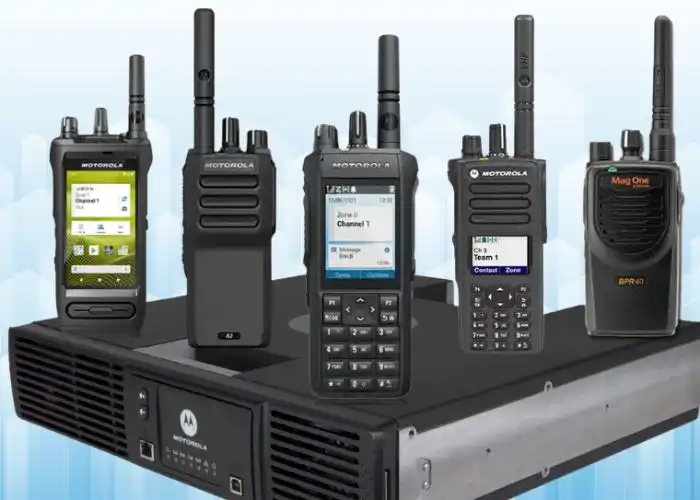Digital Mobile Radio (DMR) is a digital radio standard used for voice and data communication. Designed by the European Telecommunications Standards Institute (ETSI), DMR offers clear audio, better coverage, and advanced features compared to older analog systems.
Understanding DMR is important because it helps businesses and public safety organizations communicate more clearly. With DMR, users can not only transmit voice, but they can send text messages, share data, and track locations, making it a versatile tool in modern communication networks. Knowing how DMR works can help organizations improve their communication systems and stay connected efficiently as technology evolves.
What is Digital Mobile Radio (DMR)?
Okay, so let’s get a bit more specific about digital mobile radio. Like we said above, DMR is a digital radio standard designed to replace traditional analog systems, offering improved voice quality, amplified features, and more efficient use of radio spectrum. DMR operates on various frequency bands and supports a number of communication modes, including voice, text messaging, and data transmission.
The development of DMR was spearheaded by the European Telecommunications Standards Institute (ETSI), which intends to create an open standard that manufacturers and users could adopt globally. ETSI established the DMR standard in 2005, ensuring interoperability between equipment from different manufacturers, leading to a more competitive market.
DMR is divided into three tiers, each catering to different user needs:
- Tier I: Designed for license-free, low power, radio-to-radio use in the United States, suitable for personal and recreational use.
- Tier II: Intended for FCC licensed conventional radio systems (including repeaters), commonly used by small to medium-sized businesses for local communication.
- Tier III: Focused on trunked radio systems, offering advanced features and wide-area communication for large enterprise organizations and public safety agencies.
Key Features of DMR
Digital Mobile Radio (DMR) has several key features distinguishing it from traditional analog systems. One of the primary features is precise voice quality and clarity. DMR uses digital encoding to reduce background noise and improve the overall sound quality, ensuring clear and intelligible communication even in noisy environments.
Another significant feature is better spectrum efficiency. DMR employs Time Division Multiple Access (TDMA) technology, which splits a single frequency into two separate time slots. This method allows two simultaneous conversations on the same channel, ultimately doubling the capacity of the radio spectrum and making more efficient use of available frequencies.
DMR also supports advanced data services and applications. Beyond voice communication, DMR systems can transmit text messages, GPS location data, and other types of information. These data capabilities enable a wide range of applications, such as fleet management, remote monitoring, and emergency alerts, enhancing the overall functionality of the communication system.
DMR also offers scalability and flexibility. The technology is designed to be scalable, meaning it can be adapted to meet the needs of small businesses as they grow, as well as large organizations who have big needs from the get-go. DMR systems can be easily expanded by adding more radios or infrastructure, allowing them to grow with the organization’s requirements.

6 Benefits of DMR Technology
So, just what do all these features mean in terms of benefits? DMR technology offers several advantages that can significantly improve communication systems for businesses and public safety organizations.
Here are the key benefits:
- Improved Communication Range and Coverage: With DMR, users can enjoy clearer and more reliable communication over longer distances compared to analog systems. This means fewer dead zones and better connectivity, even in challenging environments.
- Robust Security Features: DMR provides robust encryption options to protect sensitive information from eavesdropping and unauthorized access. This is necessary for organizations that need to make sure their communications remain private and secure.
- Reasonably Priced: DMR systems are often more economical in the long run. The efficient use of radio spectrum reduces the need for additional frequencies, and the longer lifespan of digital equipment can result in lower maintenance and replacement costs.
- Interoperability with Existing Systems: One of the most frustrating things that can happen when you invest in new technology, is that you often have to upgrade or replace other dependent technologies. This can quickly increase costs, adoption times, and more. However, DMR can work alongside existing analog systems, allowing for a smooth transition to digital without replacing all equipment at once. This mixed-mode interoperability helps organizations to upgrade their communication systems gradually when the timing is right and budgets allow.
- Support for GPS and Other Location-Based Services: DMR’s ability to transmit GPS data enables real-time tracking of personnel and assets, which is valuable for fleet management, logistics, and emergency response operations.
- Advanced-Data Capabilities: DMR supports text messaging and data applications as well. This enables remote monitoring, emergency alerts, and integration with other digital systems.
Digital Mobile Radio Across Industries
Digital Mobile Radio (DMR) technology is versatile and can be adapted to various industries, providing superior communication capabilities compared to analog systems. Here’s how DMR excels in different sectors:
Public Safety and Emergency Services
In public safety and emergency services, clear and reliable communication is critical. DMR offers better voice clarity and secure communication channels, making coordinating during emergencies easier for first responders.
For instance, during a large-scale disaster, DMR’s ability to support GPS tracking can help manage and deploy resources efficiently. Its robust encryption guarantees that sensitive information remains confidential, which is so important for law enforcement and medical services.
Transportation and Logistics
The transportation and logistics industry relies heavily on efficient communication to manage fleets and prioritize timely deliveries. DMR’s advanced data services enable real-time tracking of vehicles, helping companies monitor routes and manage logistics better.
For example, a logistics company can use DMR to send route updates and receive status reports from drivers, improving overall efficiency and reducing delays. The superior range and coverage of DMR also helps drivers stay connected, even in remote areas.
Utilities and Energy
In the utilities and energy sector, reliable communication is necessary for maintaining operations and providing safety. DMR’s ability to transmit data and voice over long distances makes it ideal for coordinating field operations and monitoring infrastructure.
For instance, a utility company can use DMR to communicate with field workers performing maintenance on power lines, ensuring they have real-time updates and can respond quickly to any issues. The scalability of DMR allows it to grow with the company’s needs, making it an economical solution.
Manufacturing and Industrial Sectors
Manufacturing and industrial environments can be noisy and require highly precise communication systems to create safety and efficiency. DMR’s voice quality and noise-canceling capabilities make it easier for workers to communicate clearly.
For example, in a large factory, DMR can be used to coordinate between different departments, manage workflows, and address safety concerns promptly. The flexibility of DMR also allows integration with other systems, such as automated machinery, growing overall operational efficiency.
Hospitality and Event Management
In the hospitality and event management industries, clear and precise communication is non-negotiable for providing excellent service and managing events flawlessly. DMR’s ability to support multiple communication channels allows different teams to do just that.
As an example, during a large event, DMR can be used to manage security, coordinate with catering services, and make sure that all aspects of the event run smoothly. The advanced data capabilities of DMR also allow for quick dissemination of information, such as schedule changes or emergency alerts. The result is a much better guest experience.

Choosing the Right DMR Solution at EMCI Wireless
Selecting the right DMR solution, such as MOTOTRBO Digital Mobile Radios (DMR), for your organization involves several key factors. Consider the size of your operation, the range of coverage needed, and the specific communication features required. MOTOTRBO systems, including models like the Motorola XPR 5350e and XPR 5380e, offer improved voice clarity, advanced data capabilities, and some serious security features.
When comparing MOTOTRBO DMR with other digital radio technologies like TETRA and P25, it’s important to understand their differences. TETRA is often used in Europe for public safety, offering high security and multiple communication channels, while P25 is prevalent in North America for similar purposes. However, MOTOTRBO DMR stands out for its affordability, ease of use, and global standardization.
Embrace DMR Technology with EMCI Wireless
Digital Mobile Radio (DMR) technology offers clear advantages in voice quality, spectrum efficiency, data capabilities, and scalability across various industries. The benefits of DMR, such as improved communication range, better security, and lucrative pricing, make it a valuable tool for modern communication needs. The way we see it, organizations seeking reliable and efficient communication systems should consider adopting DMR technology.
EMCI Wireless provides the very best in MOTOTRBO Digital Mobile Radios. For more information or a consultation on how DMR can benefit your organization, contact EMCI Wireless today and let our experts guide you in finding the perfect solution for your communication needs.

